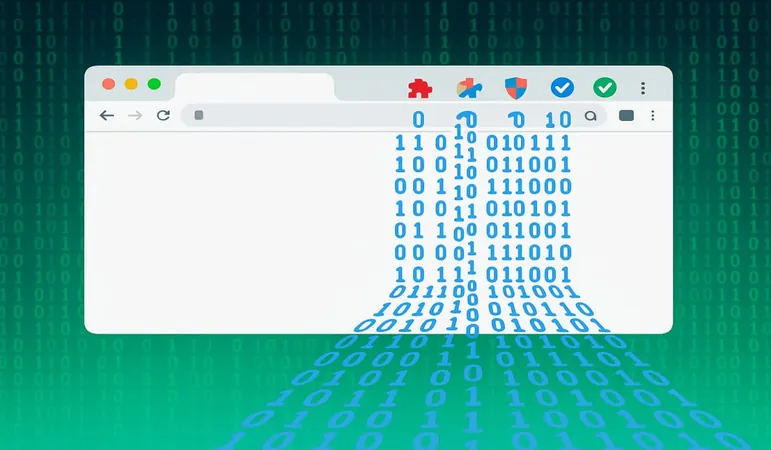
Shocking Data Leak Discovered in Popular Chrome Extensions!
2025-06-06
Author: Sarah
Major Security Threat Uncovered!
A startling investigation has exposed that numerous popular Google Chrome extensions are transmitting sensitive user data through unencrypted HTTP connections. This alarming breach could potentially endanger millions of users, placing their privacy and security on the line!
The Culprits Revealed!
Cybersecurity researchers, led by findings from Symantec, identified several extensions at the center of this scandal. Among them are:
- **PI Rank (ID: ccgdboldgdlngcgfdolahmiilojmfndl)**
- **Browsec VPN (ID: omghfjlpggmjjaagoclmmobgdodcjboh)**
- **MSN New Tab (ID: lklfbkdigihjaaeamncibechhgalldgl)**
- **SEMRush Rank (ID: idbhoeaiokcojcgappfigpifhpkjgmab)**
- **DualSafe Password Manager & Digital Vault (ID: lgbjhdkjmpgjgcbcdlhkokkckpjmedgc)**
Extensions Betraying Users' Trust!
These extensions, designed to assist users in optimizing web activities—from password management to tracking online rankings—are instead leaking crucial data without any encryption. This means anyone on the same network can easily intercept and view what’s being transmitted.
Your Data in Jeopardy!
Details such as the websites users visit, their operating system, unique machine identifiers, and various telemetry data are all at risk. Shockingly, some extensions even contain hardcoded API keys and secrets, making it a goldmine for hackers!
Public Wi-Fi Equals Big Trouble!
When data is sent over unencrypted HTTP, it travels in plaintext, making it easy prey for malicious actors, especially on public Wi-Fi networks. For instance, the Browsec VPN extension—boasting over six million users—was caught sending user information during the uninstall process without encryption!
Data Leaks: More Than Just Numbers!
Extensions like SEMRush Rank and PI Rank were discovered sending complete URLs of visited websites over insecure connections. Such practices invite intrusive monitoring, enabling criminals to spy on user behavior.
A Call for Action!
Experts like Patrick Tiquet from Keeper Security have sounded the alarm, pointing out that this troubling incident exposes a significant flaw in extension security. Users are left vulnerable to profiling, phishing attacks, and even direct attacks on unsecured networks.
What Can You Do?
While no passwords or sensitive financial data were leaked, the compromise of machine identifiers and browsing habits is serious. Users are urged to uninstall the affected extensions and keep an eye on their data security.
Symantec has reached out to involved developers, and so far, only DualSafe Password Manager has remedied the situation. Until other issues are addressed, it's best to steer clear of these extensions. Always scrutinize the permissions requested by extensions, opt for known publishers, and consider a trustworthy security solution.
Stay Safe Online!
Remember, any tool claiming to enhance your privacy must be investigated thoroughly. Don't let your data fall into the wrong hands!

 Brasil (PT)
Brasil (PT)
 Canada (EN)
Canada (EN)
 Chile (ES)
Chile (ES)
 Česko (CS)
Česko (CS)
 대한민국 (KO)
대한민국 (KO)
 España (ES)
España (ES)
 France (FR)
France (FR)
 Hong Kong (EN)
Hong Kong (EN)
 Italia (IT)
Italia (IT)
 日本 (JA)
日本 (JA)
 Magyarország (HU)
Magyarország (HU)
 Norge (NO)
Norge (NO)
 Polska (PL)
Polska (PL)
 Schweiz (DE)
Schweiz (DE)
 Singapore (EN)
Singapore (EN)
 Sverige (SV)
Sverige (SV)
 Suomi (FI)
Suomi (FI)
 Türkiye (TR)
Türkiye (TR)
 الإمارات العربية المتحدة (AR)
الإمارات العربية المتحدة (AR)